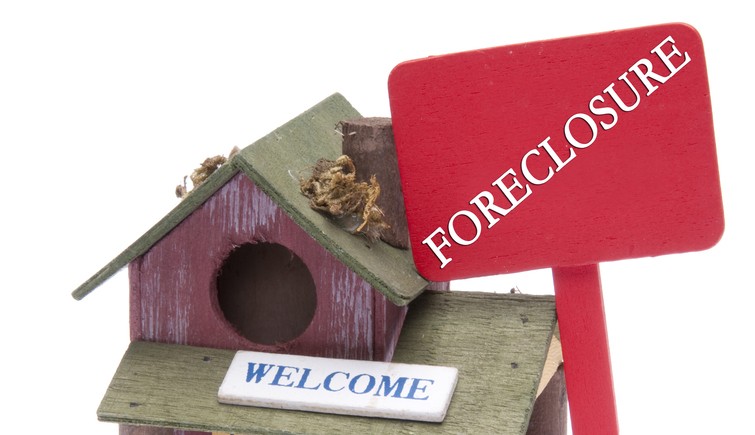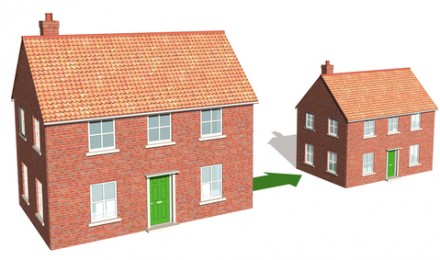Deed in Lieu of Foreclosure
A deed in lieu of foreclosure is a foreclosure alternative wherein you agree to relinquish your home and all rights to it in exchange for your mortgage lender agreeing to absolve you of all liability for the outstanding mortgage payments. In other words, you give up the house and your mortgage balance is forgiven. Deed in lieu of foreclosure can be a better option for homeowners than an actual foreclosure for many reasons, and it is also advantageous to the lender as well.
Benefits of Deed in Lieu of Foreclosure
One of the biggest benefits of deed in lieu of foreclosure is also the most obvious benefit: the home is not foreclosed on. This means that the bank does not need to spend money on legal expenses, posting notice of the foreclosure, or other costs associated with foreclosing on a house. A homeowner also does not have to deal with published notices of his homes foreclosure in the newspaper or posted at the home, all of which can be a traumatic and sometimes embarrassing process.
Other benefits of a deed in lieu of foreclosure include:
- The opportunity to avoid a deficiency judgment. Homeowners may become liable in certain cases for any outstanding balance due on the mortgage that the bank is not able to recover by selling the home. This occurs when a bank seeks a “deficiency judgment” and the court orders the homeowner to pay this money even though the home is gone. With a deed in lieu of foreclosure, the homeowner can negotiate to get the lender to agree not to pursue a deficiency judgment.
- Less damage to your credit. While both foreclosure and deed in lieu of foreclosure are going to show up on your credit report and they are going to bring down your credit score, a deed in lieu of foreclosure is generally viewed as less damaging because you at least took action to deal with your problem.
- You do not have to find a buyer for the home, as you would in a short sale. Sometimes, when the real estate market is especially bad, it can be impossible even to find a buyer for a short sale of a home. A deed in lieu of foreclosure absolves the homeowner of that responsibility.
There may also be other benefits, depending on your lender and what programs are in place. For instance, the FHA created a program called ‘Cash for Keys’ where up to $2000 in compensation may be paid to homeowners who turn over their keys in a deed in lieu of foreclosure arrangement.
Meeting the Requirements
In order to qualify for a deed in lieu of foreclosure, you must meet certain requirements that vary from lender to lender. Typically, you will need to be behind on your payments and unable to make your payments. Often, it is also a requirement that the home must have been on the market for at least 90 days before the deed in lieu of foreclosure option is available. Finally, HUD stipulates that a deed in lieu of foreclosure transaction must be completed within 90 days from the process was initiated.
For more information on how to meet the requirements of deed in lieu of foreclosure or of how a deed in lieu of foreclosure can help you, you should speak with your lender.
Deed in Lieu of Foreclosure
A deed in lieu of foreclosure is a foreclosure alternative wherein you agree to relinquish your home and all rights to it in exchange for your mortgage lender agreeing to absolve you of all liability for the outstanding mortgage payments. In other words, you give up the house and your mortgage balance is forgiven. Deed in lieu of foreclosure can be a better option for homeowners than an actual foreclosure for many reasons, and it is also advantageous to the lender as well.
Benefits of Deed in Lieu of Foreclosure
One of the biggest benefits of deed in lieu of foreclosure is also the most obvious benefit: the home is not foreclosed on. This means that the bank does not need to spend money on legal expenses, posting notice of the foreclosure, or other costs associated with foreclosing on a house. A homeowner also does not have to deal with published notices of his homes foreclosure in the newspaper or posted at the home, all of which can be a traumatic and sometimes embarrassing process.
Other benefits of a deed in lieu of foreclosure include:
- The opportunity to avoid a deficiency judgment. Homeowners may become liable in certain cases for any outstanding balance due on the mortgage that the bank is not able to recover by selling the home. This occurs when a bank seeks a “deficiency judgment” and the court orders the homeowner to pay this money even though the home is gone. With a deed in lieu of foreclosure, the homeowner can negotiate to get the lender to agree not to pursue a deficiency judgment.
- Less damage to your credit. While both foreclosure and deed in lieu of foreclosure are going to show up on your credit report and they are going to bring down your credit score, a deed in lieu of foreclosure is generally viewed as less damaging because you at least took action to deal with your problem.
- You do not have to find a buyer for the home, as you would in a short sale. Sometimes, when the real estate market is especially bad, it can be impossible even to find a buyer for a short sale of a home. A deed in lieu of foreclosure absolves the homeowner of that responsibility.
There may also be other benefits, depending on your lender and what programs are in place. For instance, the FHA created a program called ‘Cash for Keys’ where up to $2000 in compensation may be paid to homeowners who turn over their keys in a deed in lieu of foreclosure arrangement.
Meeting the Requirements
In order to qualify for a deed in lieu of foreclosure, you must meet certain requirements that vary from lender to lender. Typically, you will need to be behind on your payments and unable to make your payments. Often, it is also a requirement that the home must have been on the market for at least 90 days before the deed in lieu of foreclosure option is available. Finally, HUD stipulates that a deed in lieu of foreclosure transaction must be completed within 90 days from the process was initiated.
For more information on how to meet the requirements of deed in lieu of foreclosure or of how a deed in lieu of foreclosure can help you, you should speak with your lender.







